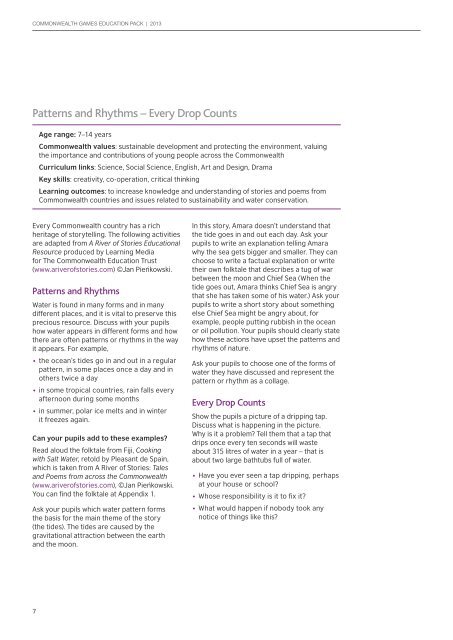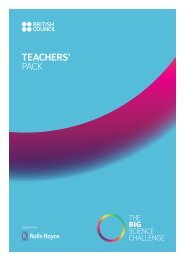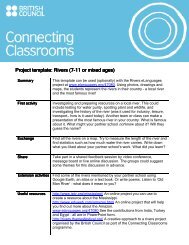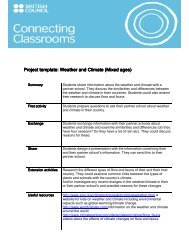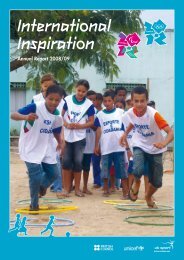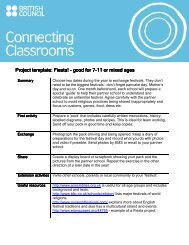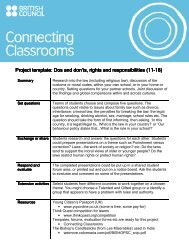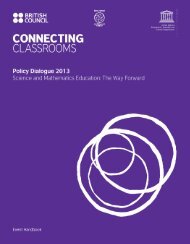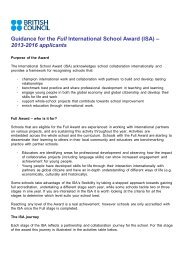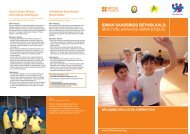Commonwealth Education Pack - British Council Schools Online
Commonwealth Education Pack - British Council Schools Online
Commonwealth Education Pack - British Council Schools Online
Create successful ePaper yourself
Turn your PDF publications into a flip-book with our unique Google optimized e-Paper software.
COMMONWEALTH GAMES EDUCATION PACK | 2013<br />
Patterns and Rhythms – Every Drop Counts<br />
Age range: 7–14 years<br />
<strong>Commonwealth</strong> values: sustainable development and protecting the environment, valuing<br />
the importance and contributions of young people across the <strong>Commonwealth</strong><br />
Curriculum links: Science, Social Science, English, Art and Design, Drama<br />
Key skills: creativity, co-operation, critical thinking<br />
Learning outcomes: to increase knowledge and understanding of stories and poems from<br />
<strong>Commonwealth</strong> countries and issues related to sustainability and water conservation.<br />
Every <strong>Commonwealth</strong> country has a rich<br />
heritage of storytelling. The following activities<br />
are adapted from A River of Stories <strong>Education</strong>al<br />
Resource produced by Learning Media<br />
for The <strong>Commonwealth</strong> <strong>Education</strong> Trust<br />
(www.ariverofstories.com) ©Jan Pieńkowski.<br />
Patterns and Rhythms<br />
Water is found in many forms and in many<br />
different places, and it is vital to preserve this<br />
precious resource. Discuss with your pupils<br />
how water appears in different forms and how<br />
there are often patterns or rhythms in the way<br />
it appears. For example,<br />
• the ocean’s tides go in and out in a regular<br />
pattern, in some places once a day and in<br />
others twice a day<br />
• in some tropical countries, rain falls every<br />
afternoon during some months<br />
• in summer, polar ice melts and in winter<br />
it freezes again.<br />
Can your pupils add to these examples<br />
Read aloud the folktale from Fiji, Cooking<br />
with Salt Water, retold by Pleasant de Spain,<br />
which is taken from A River of Stories: Tales<br />
and Poems from across the <strong>Commonwealth</strong><br />
(www.ariverofstories.com), ©Jan Pieńkowski.<br />
You can find the folktale at Appendix 1.<br />
Ask your pupils which water pattern forms<br />
the basis for the main theme of the story<br />
(the tides). The tides are caused by the<br />
gravitational attraction between the earth<br />
and the moon.<br />
In this story, Amara doesn’t understand that<br />
the tide goes in and out each day. Ask your<br />
pupils to write an explanation telling Amara<br />
why the sea gets bigger and smaller. They can<br />
choose to write a factual explanation or write<br />
their own folktale that describes a tug of war<br />
between the moon and Chief Sea (When the<br />
tide goes out, Amara thinks Chief Sea is angry<br />
that she has taken some of his water.) Ask your<br />
pupils to write a short story about something<br />
else Chief Sea might be angry about, for<br />
example, people putting rubbish in the ocean<br />
or oil pollution. Your pupils should clearly state<br />
how these actions have upset the patterns and<br />
rhythms of nature.<br />
Ask your pupils to choose one of the forms of<br />
water they have discussed and represent the<br />
pattern or rhythm as a collage.<br />
Every Drop Counts<br />
Show the pupils a picture of a dripping tap.<br />
Discuss what is happening in the picture.<br />
Why is it a problem Tell them that a tap that<br />
drips once every ten seconds will waste<br />
about 315 litres of water in a year – that is<br />
about two large bathtubs full of water.<br />
• Have you ever seen a tap dripping, perhaps<br />
at your house or school<br />
• Whose responsibility is it to fix it<br />
• What would happen if nobody took any<br />
notice of things like this<br />
7


